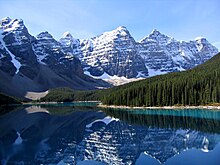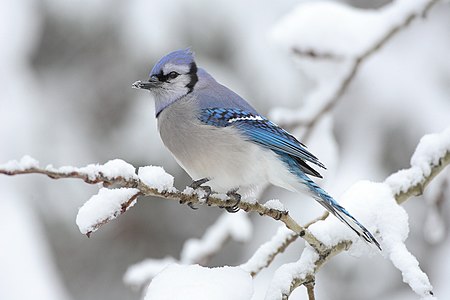Portal:Canada
| Showcase | Contents | Contributing |
Introduction
Canada is a country in North America. Its ten provinces and three territories extend from the Atlantic Ocean to the Pacific Ocean and northward into the Arctic Ocean, making it the world's second-largest country by total area, with the world's longest coastline. Its border with the United States is the world's longest international land border. The country is characterized by a wide range of both meteorologic and geological regions. With a population of just over 41 million people, it has widely varying population densities, with the majority residing in urban areas and large areas of the country being sparsely populated. Canada's capital is Ottawa and its three largest metropolitan areas are Toronto, Montreal, and Vancouver.
Canada is a parliamentary democracy and a constitutional monarchy in the Westminster tradition. The country's head of government is the prime minister, who holds office by virtue of their ability to command the confidence of the elected House of Commons and is appointed by the governor general, representing the monarch of Canada, the ceremonial head of state. The country is a Commonwealth realm and is officially bilingual (English and French) in the federal jurisdiction. It is very highly ranked in international measurements of government transparency, quality of life, economic competitiveness, innovation, education and human rights. It is one of the world's most ethnically diverse and multicultural nations, the product of large-scale immigration. Canada's long and complex relationship with the United States has had a significant impact on its history, economy, and culture.
A developed country, Canada has a high nominal per capita income globally and its advanced economy ranks among the largest in the world by nominal GDP, relying chiefly upon its abundant natural resources and well-developed international trade networks. Recognized as a middle power, Canada's strong support for multilateralism and internationalism has been closely related to its foreign relations policies of peacekeeping and aid for developing countries. Canada is part of multiple international organizations and forums. (Full article...)
Featured article -
Banff National Park is Canada's first national park, established in 1885 as Rocky Mountains Park. Located in Alberta's Rocky Mountains, 110–180 kilometres (68–112 mi) west of Calgary, Banff encompasses 6,641 square kilometres (2,564 sq mi) of mountainous terrain, with many glaciers and ice fields, dense coniferous forest, and alpine landscapes. Provincial forests and Yoho National Park are neighbours to the west, while Kootenay National Park is located to the south and Kananaskis Country to the southeast. The main commercial centre of the park is the town of Banff, in the Bow River valley. (Full article...)
Featured biography -
Major-General Sir Isaac Brock KB (6 October 1769 – 13 October 1812) was a British Army officer and colonial administrator from Guernsey. Brock was assigned to Lower Canada in 1802. Despite facing desertions and near-mutinies, he commanded his regiment in Upper Canada (part of present-day Ontario) successfully for many years. He was promoted to major general, and became responsible for defending Upper Canada against the United States. While many in Canada and Britain believed war could be averted, Brock began to ready the army and militia for what was to come. When the War of 1812 broke out, the populace was prepared, and quick victories at Fort Mackinac and Detroit defeated American invasion efforts. (Full article...)
Selected panorama -
National symbol -

The National Flag of Canada (French: Drapeau national du Canada), often referred to simply as the Canadian flag, consists of a red field with a white square at its centre in the ratio of 1∶2∶1, in which is featured one stylized, red, 11-pointed maple leaf charged in the centre. It is the first flag to have been adopted by both houses of Parliament and officially proclaimed by the Canadian monarch as the country's official national flag. The flag has become the predominant and most recognizable national symbol of Canada. (Full article...)
Selected vital article -
The culture of Canada embodies the artistic, culinary, literary, humour, musical, political and social elements that are representative of Canadians. Throughout Canada's history, its culture has been influenced firstly by its indigenous cultures, and later by European culture and traditions, mostly by the British and French. Over time, elements of the cultures of Canada's immigrant populations have become incorporated to form a Canadian cultural mosaic. Certain segments of Canada's population have, to varying extents, also been influenced by American culture due to shared language (in English-speaking Canada), significant media penetration, and geographic proximity. (Full article...)
Selected picture -
Current events
- January 1, 2025 – Foreign relations of Mexico
- Mexico's Tax Administration Service implements new tariffs, including a 19% duty on goods from countries without international trade agreements with Mexico and a 17% duty on goods from Canada and the United States under certain value thresholds. (Reuters)
- December 16, 2024 – Resignation of Chrystia Freeland
- Chrystia Freeland resigns as Canada's Deputy Prime Minister and Minister of Finance amid disagreements with Prime Minister Justin Trudeau on increased government spending and how to handle possible U.S. tariffs imposed by the incoming Trump administration. (Reuters)
- December 11, 2024 – Russo-Ukrainian War
- The Parliament of Canada approves the allocation of CA$764 million (US$587 million) in military aid to Ukraine. (Ukrainska Pravda)
- December 3, 2024 – Red Sea crisis
- The Government of Canada officially designates the Yemen-based Houthi movement as a terrorist organization due to the group's attacks on civilian and military vessels in the Red Sea. (Al Jazeera)
- November 20, 2024 – November 2024 Northeast Pacific bomb cyclone
- Two people are killed and more than 570,000 people are without power when a bomb cyclone makes landfall over the West Coast of the United States and British Columbia, Canada. (CNN) (NBC News)
- November 15, 2024 –
- The Canadian Union of Postal Workers go on strike after failing to renegotiate their contract with Canada Post. (AP)
Did you know -

- ... that both Christian Albright and De'Montre Tuggle were born on the same day, named second-team all-Mid-American Conference in 2020, signed with the Chicago Bears in 2022, and debuted in the CFL in 2023?
- ... that George Thomas Taylor was one of Canada's earliest nature photographers?
- ... that an ancient Canadian archaeological site was discovered during the construction of a dump?
- ... that while seeking funding for The Clarion, Carrie Best was told by a donor: "You are just a small voice crying in the wilderness – but keep on crying"?
- ... that the St. Raphael Provincial Park in Northern Ontario, Canada, is part of the 1,530 km2 (590 sq mi) St. Raphael Signature Site, which is recognized for its natural and recreational values?
- ... that Eagle-Dogtooth Provincial Park in Ontario, Canada, contains part of the Experimental Lakes Area, a controlled area for conducting scientific experiments in lakes?
- ... that a member of the House of Lords was the principal of a Canadian junior school?
Featured list -
The Prince of Wales Trophy, also known as the Wales Trophy, is a team award presented by the National Hockey League (NHL). Named for Edward, Prince of Wales (later King Edward VIII and then Duke of Windsor), it has been awarded for different accomplishments throughout its history. (Full article...)
Main articles
Associated Wikimedia
The following Wikimedia Foundation sister projects provide more on this subject:
-
Commons
Free media repository -
Wikibooks
Free textbooks and manuals -
Wikidata
Free knowledge base -
Wikinews
Free-content news -
Wikiquote
Collection of quotations -
Wikisource
Free-content library -
Wikiversity
Free learning tools -
Wikivoyage
Free travel guide -
Wiktionary
Dictionary and thesaurus






























